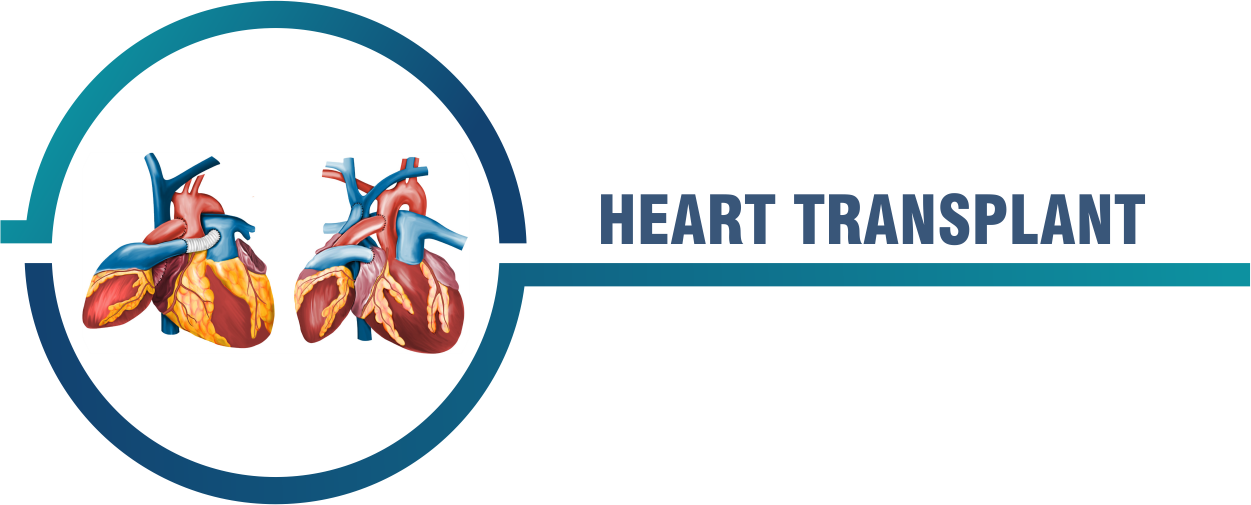
About Heart Transplant
A Heart Transplant is a medical procedure in which a cardiac surgeon replaces the damaged heart with a healthy donor heart. Cardiac transplants are typically only advised by medical professionals for patients who have extensive heart disease that is in its final stages and who is not responding to treatment.
One of the most difficult surgeries is heart transplant surgery. However, the employment of cutting-edge technology by Indian medical professionals is luring many foreigners to India for organ transplants.
Types of Transplant :
- Orthotopic Transplant : For patients receiving organ transplants, doctors typically prescribe orthotopic transplant. An orthotopic transplant involves replacing the recipient's heart with a healthy donor heart. The surgery is carried out while completely unconscious. The patient is placed in a bypass machine by the surgeons to oxygenate the blood while the procedure is being done. The donor's heart is put in place of the recipient's heart once it has been removed.
- Heterotopic Transplant : The heterotopic transplantation or “piggyback” transplantation, is performed rarely by doctors. During this type of heart transplant, the donor’s heart is placed in the recipient without removing the recipient’s diseased heart. This type of transplant is usually done in people with underlying lung disorders.
Who is/are eligible to get a heart transplant?
You must determine your eligibility before having a heart transplant in India because in some cases, this treatment might be fatal. Your eligibility for a heart transplant may be affected by a number of circumstances, including:
- Infection: Your doctor might advise you to delay the transplant if you have an acute infection since it can lead to difficulties after surgery.
- Inability to ensure heart health: Your doctor will not advise a heart transplant operation for you if he believes that you will not take the essential precautions to ensure your new heart health.
- Underlying disease: If you have an underlying illness that could shorten your life expectancy even after a heart transplant, your doctor might not recommend it for you.
- Cancer history: If you have a history of cancer, your doctor might not advise getting a heart transplant.
- Weakness: If the doctor is concerned that you won't recover from the transplant, he may not recommend a heart transplant.
The doctor also considers your age, lifestyle, and general health while determining your eligibility for a heart transplant.
Symptoms
The following are the most typical causes of heart failure:
- Heart attack, also known as myocardial infarction.
- elevated blood pressure.
- Heart valve dysfunction.
- infection of the heart by a virus.
- Congenital or birth disorders of the heart.
Risk Factor
Although heart transplant surgery can save lives, there are significant hazards involved. Some of these hazards can be reduced by attentive monitoring, treatment, and routine checkups at the doctor.
- Surgery fails to succeed.
- Adverse effects of immunosuppressants.
- Infection.
- Cancer.
- Concerns about continuing to lead such a sedentary lifestyle.
Investigations
- Liver and kidney function blood test, to ensure that the organs are working efficiently. Also, these tests help the doctor to evaluate the levels of the other components present in the blood.
- An electrocardiogram (EKG) to determine the heart health
- Chest X-ray
- Additionally, your doctor may suggest Echocardiography, to know about the size and shape of your heart. This test also helps to determine the efficacy of the chambers of the heart and the valves that separate the upper and lower chambers.
| Procedure | India | Turkey | Dubai |
| (Price in USD) | (Price in USD) | (Price in USD) | |
| Heart Transplant | 60000 | 95000 | - |
| Transposition of the Great Arteries (TGA) Surgery | 6800 | - | - |
| Heart Implants | 5600 | - | - |
Note : This is an approximate cost and may vary depending on various condition of the patient health after physical evaluation.
Treatment Options
Side Effects
- Increased susceptibility to infections is one of these.
- Gaining weight.
- Renal issues.
- Elevated blood pressure.
- Diabetes.
- Fragile bones (osteoporosis).
- A higher chance of developing some cancers, including skin cancer.
Benefits
Success Rate
The success rate and life expectancy following a heart transplant have greatly increased thanks to cutting-edge technologies. The success rate of heart transplants has recently increased dramatically, reaching 95%, according to physicians. Many foreigners have chosen to receive their heart transplants in India because to the country's high rate of success in performing the procedure. According to medical professionals, 88% of patients who received heart transplants survived the first postoperative year. But after five years, over 75% of persons were still alive.
